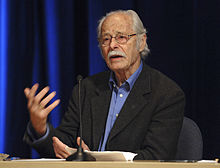Fredrik Barth
Fredrik Thomas Weybye Barth (born December 22, 1928 in Leipzig ; † January 24, 2016 ) was a Norwegian ethnologist and social anthropologist who primarily deals with the political anthropology of stateless or cross-border societies such as the Kurds and Pashtuns , but also with change Norwegian family structures and the role of entrepreneurship among the northern Norwegian fishermen and Sami (people) . He is considered one of the most productive and important social anthropologists of his generation.
life and work
Fredrik Barth's father, the geologist Thomas Barth, was a private lecturer at the University of Leipzig and moved to the USA with his family in 1929. Fredrik Barth studied paleanthropology and art history at the University of Chicago and in the United Kingdom. His first field research took him to Kurdistan . In 1957 he received his doctorate from the University of Cambridge . In 1961 he became a professor at the University of Bergen and founded the Institute for Social Anthropology there. He criticized the structuralism prevailing in ethnology in the 1950s and 1960s and followed the theoretical approaches of Alfred Radcliffe-Brown , Max Weber Émile Durkheim and Karl Marx . He was a versatile field researcher and creative theorist. His field research took him to Iraq , Iran and Sudan , Pakistan , Balochistan , New Guinea , Oman , Bali and Bhutan .
He was best known for the introduction to the work he edited, Ethnic Groups and Boundaries (1969), and the chapter on the Pashtuns contained in this volume, in which he examined the construction of ethnic identity in stateless societies from a social constructivist perspective. He takes the need for distinction through drawing boundaries as the cause . Barth ethnic groups are constituted by biological criteria, constant cultural values, typical forms of behavior and communication coordinated with them, as well as through self and external identification. However, the groups are not made up of observable differences, but these are observed on the basis of existing group delimitations. Such demarcation strategies form a never-ending dynamic process in which biological factors do not play a dominant role. Demographic and ecological conditions support the development of effective social systems that enable survival, with ethnic and cultural identity serving as an instrument of power for the creation and maintenance of living spaces. This is linked to the tendency to intolerance towards other ethnic groups.
In 1974 Barth went to the University of Oslo and headed the Ethnographic Museum there. He has also taught at Emory University in Atlanta and Harvard University . In 2002 he gave a series of lectures on the British School of Social Anthropology at the opening of the Max Planck Institute for Social Anthropology in Leipzig .
In 1997 he became a member of the American Academy of Arts and Sciences . In 2003 he was elected a corresponding member of the British Academy .
Works (selection)
- Balinese worlds. Chicago: University of Chicago Press, 1993.
- Cosmologies in the making: a generative approach to cultural variation in inner New Guinea. Cambridge: Cambridge University Press, 1987.
- Sohar, culture and society in an Omani town. Baltimore: Johns Hopkins University Press, 1983.
- Principles of Organization in Southern Kurdistan. 1953.
- Ritual and knowledge among the Baktaman of New Guinea. Oslo: Universitetsforlaget, 1975.
- (Ed.): Ethnic Groups and Boundaries. The Social Organization of Culture Difference . Bergen, Oslo, Tromsö: Universitesforlaget, also Little, Brown & Co. Boston, 1969.
- Models of social organization . London, Royal Anthropological Institute, 1966.
- Nomads of South Persia; the Basseri tribe of the Khamseh Confederacy. Oslo: Universitetsforlaget, 1962.
- Political leadership among Swat Pathans . London: The Athlone Press, 1959.
- The Role of the Entrepreneur in Social Change in Northern Norway. Bergen 1972 (first 1963).
- Fredrik Barth, Andre Gingrich, Robert Parkin, Sydel Silverman: One Discipline, Four Ways: British, German, French and American Anthropology. The Halle Lectures . Chicago: Chicago University Press 2005.
Web links
- Short biography: Bergen Open Research Archive - English
- Biography on Norsk Biografisk Leksikon - Norwegian
- Literature by and about Fredrik Barth in the bibliographic database WorldCat
Individual evidence
- ↑ Fredrik Barth er død
- ^ F. Barth: Pathan Identity and its Maintenance , pp. 117-134, in: Barth (Ed.) 1962.
- ^ Obituary on the website of the Max Planck Institute for Social Anthropology , January 28, 2016.
- ↑ Book of Members 1780 – present, Chapter B. (PDF; 1.2 MB) In: American Academy of Arts and Sciences (amacad.org). Retrieved May 2, 2020 .
- ^ Deceased Fellows. British Academy, accessed May 2, 2020 .
| personal data | |
|---|---|
| SURNAME | Barth, Fredrik |
| ALTERNATIVE NAMES | Barth, Fredrik Thomas Weybye (full name) |
| BRIEF DESCRIPTION | Norwegian ethnologist |
| DATE OF BIRTH | December 22, 1928 |
| PLACE OF BIRTH | Leipzig |
| DATE OF DEATH | January 24, 2016 |
